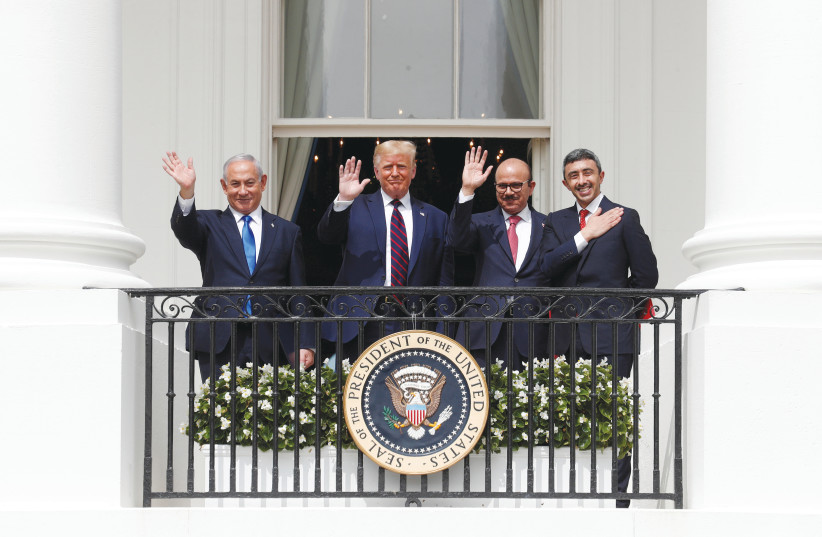On May 20, 2017, former president Donald Trump made his first trip to the Middle East. He began in Saudi Arabia and then took the first-ever direct flight from Riyadh to Tel Aviv. A little over five years later, US President Joe Biden took the same trip, this time beginning in Tel Aviv, followed by a less-historic direct flight from Tel Aviv to Saudi Arabia. The trips sound similar. But they couldn’t be more different.
The Trump visit came on the heels of the Obama administration’s betrayal of Israel at the United Nations by permitting the passage of Security Council Resolution 2334, literally deeming the Western Wall and other Jewish holy sites illegally occupied territory. And it followed the Iran nuclear deal which put Iran on a glide path to a nuclear weapon and failed to curb Iran’s sponsorship of terrorism or other malign activity – all to the extreme concern and condemnation of Israel and the moderate Sunni nations.
The Middle East anxiously awaited Trump and he did not disappoint. In Saudi Arabia, president Trump convened more than 50 Muslim nations and delivered two sobering messages: it was their responsibility in the first instance to stop radical Islamic extremism, and the fantasy held by some of destroying Israel would never be realized and would greatly hinder their progress. However, the former president added, a move by the Islamic world to moderation would be met with enormous support and approval by the United States. The Islamic world took notice and its leaders listened with rapt attention.
In Israel, president Trump continued to do and say the right things. He became (and remains) the only sitting president in history to visit the Western Wall. In his primary address to the Nation of Israel, he acknowledged, like no leader before him, the biblical ties of the Jewish People to their homeland. He said: “The ties of the Jewish people to this Holy Land are ancient and eternal. They date back thousands of years, including the reign of King David whose star now flies proudly on Israel’s white and blue flag.”
“The ties of the Jewish people to this Holy Land are ancient and eternal. They date back thousands of years, including the reign of King David whose star now flies proudly on Israel’s white and blue flag.”
Donald Trump
While few could have predicted where this stirring visit would lead, it is hardly surprising that this trip launched an unprecedented relationship between the United States and Israel, and between the United States and the moderate Arab world. Over the nearly four years that followed, America moved its embassy to Jerusalem, recognized Israel’s sovereignty over the Golan Heights, and determined that Jewish settlement of Judea and Samaria was not illegal. America also exited the Iran nuclear deal and eliminated Iran’s terror commander, Qasem Soleimani.

IT WAS almost universally predicted by the foreign policy pundits that these actions would spawn a wave of violence. We didn’t see it that way; we saw support for Israel as the solution, rather than the problem within the region. Coupled with our stand against Iran, we saw a US-Israel alliance that could be scaled to include much of the Arab world. With God’s help, our strategy worked and, contrary to predictions, spawned a wave of peace: the Abraham Accords – peace and normalization agreements between Israel and UAE, Bahrain, Sudan, Morocco and Kosovo.
Biden's Mideast trip
Last week, Biden made his Mideast pilgrimage. In Israel, he was every bit as charming as Trump, with a big smile and words of love for the Israeli people and their miraculous country. But unlike Trump, instead of a charm offensive, the charm was offensive. It was accompanied by substantive positions that were nothing less than humiliating.
Unlike Trump, Biden would not visit the Western Wall, the iconic symbol of the 4000-year connection of the Jewish People to the holy city of Jerusalem. There could be no argument that such a visit would have been controversial or dangerous – Trump’s visit to the Wall was flawless and entirely peaceful.
To make matters worse, Biden removed the Israeli flag from his car and drove to the Augusta Victoria hospital in eastern Jerusalem, refusing to be accompanied by any Israeli representative. His message, albeit symbolic, was painfully clear: Biden does not recognize Israeli sovereignty over all of Jerusalem, something Israel has asserted for more than fifty years in conformity with American law.
On Iran, Biden offered nothing more than expressing a preference for a diplomatic solution, begrudgingly conceding the platitude that the US would use force “as a last resort.” Standing alongside him, Prime Minister Yair Lapid – no one’s idea of an Iran hawk – correctly observed that there would be no diplomatic solution without a credible American threat of force. He didn’t get one from Biden.
Biden then went to visit PA leader Mahmoud Abbas in Bethlehem and threw more money at him notwithstanding Abbas’s refusal to end the “pay for slay” program that incentivizes Palestinian terrorists to murder Jews. The American taxpayers are now fully engaged – against their will and likely without their knowledge – in funding Palestinian terrorism. Biden also endorsed Israel’s retreat to the indefensible “pre-1967 borders” – a dead letter for almost all Israelis.
Biden’s trip to Saudi Arabia similarly had none of the substance, and generated none of the good will, that Trump created five years earlier. The parties could not even agree upon what they had discussed, nor the significance of what had been achieved. And Biden largely came up empty-handed in his effort to increase oil production, a pathetic request given America’s ability to increase its own.
Two presidential visits within five years to the same places. The geography may be the same but the differences are stark and disheartening.
The writer served as US ambassador to Israel under president Donald Trump.
